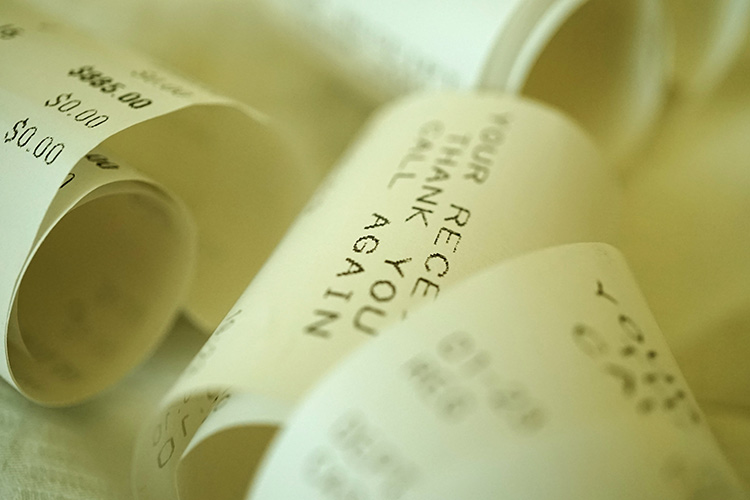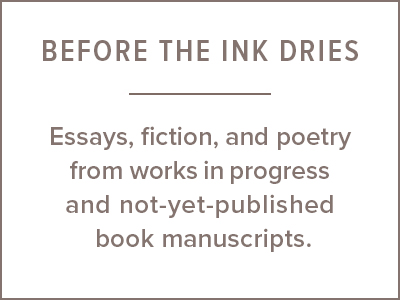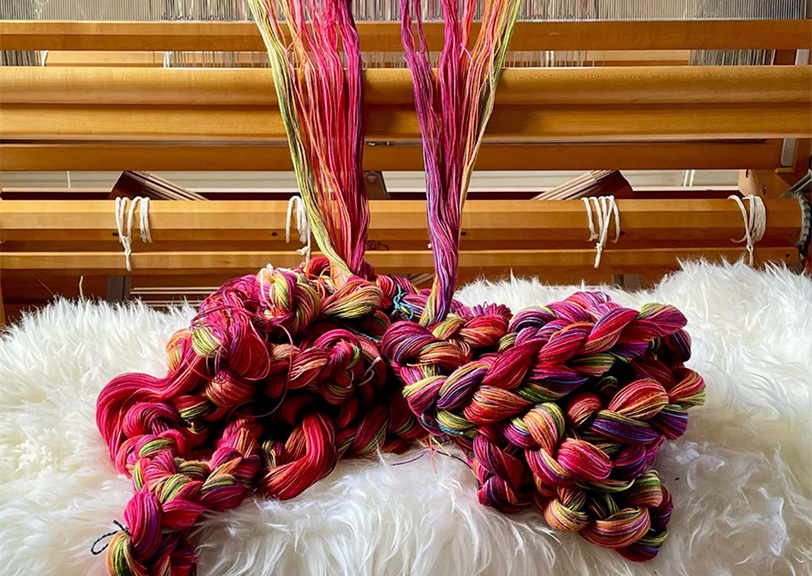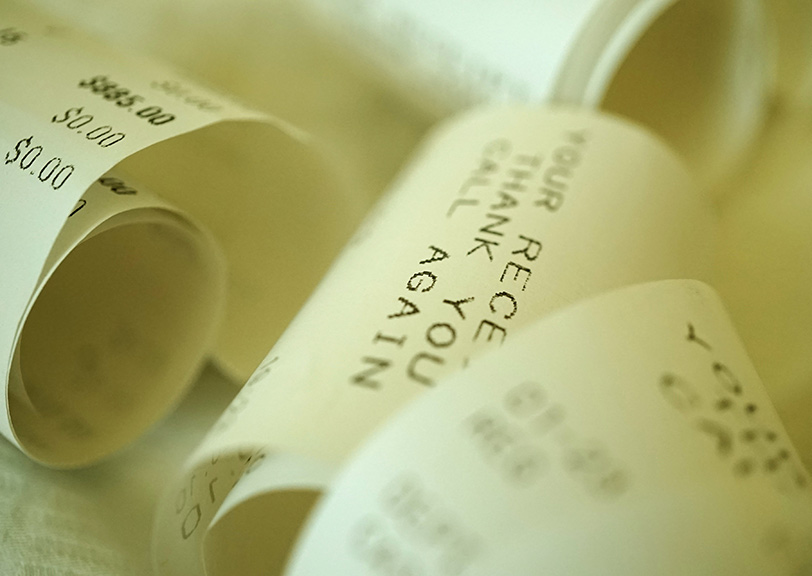ENTER YOUR EMAIL TO RECEIVE OUR WEEKLY NEWSLETTER
A Curtain of Coupons: Is it Art, Decor, or Just Plain Eccentricity?
Our second short fiction piece is about an apartment dweller, living on her own, meticulously repurposing tokens of daily commerce that conjure up scenes of “those beaded curtains in old movies”
By Myriam Chapman

 April 26, 2024
April 26, 2024
Alice watched the long strip of paper unspool from the machine attached to the register. The young man behind the counter snapped the paper out of the machine and shoved it into the shopping bag Alice had placed in front of him.
“You got a lot of coupons today,” he said.” I think you got one of those three-dollar extra refunds. You better check,” he warned her.
“Oh, I always check,” Alice said, speaking behind her mask. “I wouldn’t want to miss a really good deal.”
“That’s right,” said the young man. “You’re one of our best customers.”
“You can tell?” Alice said. She gave him a flirty smile she knew he would not see.
“Sure. Just look at that strip of coupons. It’s got to be miles long. Practically uses up all the paper in the machine. “The young man looked pleased with himself.
Alice chuckled. “Not really,” she said. “Thank goodness there’s plenty more there.”
The young man looked past her. He had lost interest. A line had formed behind her.
“You have a nice day,” he said.
“You too,” Alice said as she walked toward the door.
Once outside, Alice fished into her shopping bag. Among the articles she had just bought were two boxed tubes of toothpaste, a six-roll set of toilet paper, a large box of cereal, and a deodorant she hardly needed to use any more. She pushed those aside and very carefully felt for the strip of coupons the clerk had shoved into her bag. It was there, crushed, but not too badly. She was eager to get home.
Alice paused by the fruit and vegetable stand on the corner and bought two bananas (no point buying more, they turn black so quickly), a pound of red grapes, and an avocado that would probably not ripen for at least two days.
With her shopping done, Alice walked home full of pleasant anticipation.
In the kitchen, Alice removed her mask and conscientiously washed her hands. That done, she placed the two bananas and the avocado in the ceramic bowl she had made for her pottery class. The pound of grapes would be rinsed later. She walked to the bathroom, shoved the toilet paper rolls under the sink, tore open a box of toothpaste, and put a tube next to her toothbrush. The other box went into the cabinet over the sink. She slipped the deodorant into the wire basket where she kept her body creams. Back in the kitchen, she put the cereal box where it belonged next to the box of crackers. When it was all done, she turned her attention to the coupon strip she had left at the bottom of the shopping bag. She extracted the slightly crushed strip and placed it on the kitchen counter. She paid no attention to the howling ads and sales promotions that covered the strip. Instead, with a gentle hand, she smoothed the strip as though she were stroking a piece of antique velvet.
Alice contemplated her kitchen. Orderly, tidy—breakfast dishes drying in the dish rack, dish towels hanging from the handle of the dishwasher she no longer used now that she lived alone. Her gaze traveled to the kitchen window. A mild summer breeze blew through the open window, fluttering the coupon strips that hung from the top of the window sill, framing the window as prettily as any old-fashioned lace curtain.
Alice walked to the window. Once there had been a courtyard and a tree she could follow through the seasons and pigeons who gurgled on the window sill. All gone. Now there was only the wall of a twenty-two-story building, a daily slap in the face, all grey concrete, no joy.
That was when it had come to her—what she could do to hide the ugliness.
It had not been easy to hang the coupon strips from the window sill. Alice, who had never been tall, was now two inches shorter than the height she always claimed was hers. Dragging the stepladder out of the broom closet, positioning it under the window, climbing up the damn thing, and tacking the coupons to the top of the window frame with a small hammer had been a heart-racing adventure. But worth it. Now that the job was done.
Alice examined the strip of paper lying across the counter. “Should I put this one up there too,” she thought. “No, too cluttered. It would spoil the effect. The window looks really good the way it is.” It always gave her pleasure to walk into the kitchen.
Alice entered her bedroom. It had been her next project after the kitchen. The work was easier there; she knew the effect she was after. Strips so close together she tied each side back with a loop of red paper ribbon during the day. At night, she released the strips into a curtain that filtered the light from the street into a pleasing gray.
Alice fingered the strip in her hand. The bookshelves, she thought. No. She liked to be able to see the book titles—familiar reminders of the reader she had been, although these days she might not remember much of the plot or the characters’ names.
“Of course,” Alice mused, “the doorway. Why didn’t I think of that before? What this room needs is a curtain that parts when you walk through it like those beaded curtains in old movies. Like Hedy Lamarr and Charles Boyer in Pepe le Moko. A touch of mystery. That would be smashing, she thought. All I need are more coupons.
In the next few months, Alice continued to shop at the large drugstore on her corner, accumulating coupon strips and hanging them over the doorway to her bedroom. It amused her every time she needed to part the paper curtains to enter the room. Eventually, she had enough to hang in the hall, over the entrance to the living-room, over the living room windows, where, she thought, they added a certain artistry to the rather ordinary room. She enjoyed the flutter of the curtains whenever a breeze blew through an open window.
When she thought the effect was just right, she called her son Jack, an architect, who lived in San Francisco.
“Jack,” she said, over the phone. “Can I text you some pictures I took of the apartment?
“Sure, “Jack said. “Why? Is there a leak somewhere I should know about? “
“Oh no,” Alice said. “Nothing like that. It’s just…” And then she stopped. What could she say to Jack that would make any sense? She had covered the apartment in long chains of drugstore coupons.
“I think, “she finally brought out,” I think I’ve turned the apartment into one of those things they show in art galleries downtown. You know, an installation.”
There was a pause as Jack took in the information. “Ma,” he said, “What exactly have you done?” Jack’s voice, wary and just a bit condescending, put Alice off.
“Never mind.” She said. “I was just imagining what I could do with these silly coupons they give you at the drugstore.”
“Oh,” Jack sounded relieved. “I was afraid there for a minute. Art installation in the apartment? What kind of talk is that?”
Alice sighed. Dear Jack, she thought. Just like his father, no imagination. She cast a swift glance around her living room, where the coupon strips hung like draperies across the windows. Not exactly the same as the artist Christo’s saffron-colored panels flapping in Central Park, but still, an installation. My installation, My art.
“Got to run now,” Jack said. “Speak later, Ma. Love ’ya.”
“Love you too.” She clicked off.
Alice poured herself a cup of coffee. She would keep the coupons up for a while. So what if no one ever saw what she had done? Does art have to be seen to qualify as art? If it pleases the artist, who’s to say what it is?
Coffee cup in hand, Alice toured her living room. This must be what’s like to be a real artist, she thought, as the coupon curtains fluttered in the mild breeze—nobody understands what you do.
Myriam Chapman is a writer and French teacher who taught at the Bank Street School for Children for 40 years. She is the author of Why She Married Him (Other Press), a novel based on her Russian grandmother’s journals. Chapman’s short stories have appeared in online magazines and in print. She is currently working on a collection of sketches about older women who will not let themselves be ruled by that dreadful bully, time.











